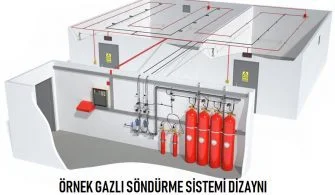The actions to be taken during a fire can be listed as follows:
- When you hear the fire alarm, stay calm and don’t panic.
- Find emergency exits and, if possible, get information about them in advance.
- Find out where the fire is and plan the shortest way to get away from it.
- Move in a standing position in areas where smoke is dense, and if not possible, move by crawling.
- If you are going to fight the fire, first find out where the fire extinguishers are and use a fire extinguisher appropriate to the size of the fire.
- Do not hurry to rescue people or items from the fire and do not put yourself in danger.
- After escaping from the fire, call emergency rescue teams and help people nearby.
- The area damaged by the fire should not be entered under any circumstances. It should not be entered without being checked by fire and other emergency rescue teams.
- Press the fire alarm button immediately: When you notice the fire, first press the fire alarm button to alert the fire department and other authorities.
- Use a fire extinguisher: If the fire is small and manageable, you can intervene using a fire extinguisher. However, make sure that you do not endanger yourself or allow the fire to grow.
- Start evacuation: If the fire continues to grow, immediately evacuate the building and start the evacuation process. Do not panic and use the exit routes as much as possible.
- Close doors and windows: During the evacuation process, you can prevent the spread of fire by closing doors and windows.
- Do not inhale smoke: Smoke produced during a fire is quite harmful. Therefore, try to avoid inhaling smoke as much as possible and if necessary, protect your mouth and nose with items such as a cloth or goggles.
- Make an emergency call: If you are trapped in the building or face another emergency, immediately call the emergency hotline for help.
Measures can be taken to prevent or control fires, such as:
- In order to reduce the risk of fire, regular fire risk analysis should be conducted.
- Maintenance of fire extinguishing equipment should be carried out periodically and used in accordance with the instructions.
- Electrical installations and devices should be inspected at certain intervals and regularly maintained.
- Smoking should be banned and activities that generate open flames or sparks should be restricted.
- Materials that could cause fire in businesses and homes should be stored appropriately and dangerous substances should be processed appropriately.
- Fire alarm systems, emergency lighting, emergency exit signs, etc. emergency equipment should be checked and regularly tested.
- Fire drills should be conducted regularly and employees should be trained in firefighting.
- We should be careful when using our electrical appliances, especially those plugged into outlets. We should unplug electrical appliances that we are not using.
- When we want to make a fire, we should make a fire in areas where fire safety is ensured and keep the fire under control. We should pay attention to the materials around the fire.
- If we smoke, we should only smoke in designated areas and dispose of cigarette butts properly.
- We should be careful when cooking on the stove. Instead of watching TV in the next room or talking on the phone while cooking, we should focus all our attention on cooking.
- It is important to identify situations where fires may occur in workplaces, schools, and homes and be prepared for these situations. For this purpose, fire evacuation plans should be prepared and fire extinguishing equipment should be properly placed.
- Knowing how to use fire fighting equipment is important. We should be familiar with how to use equipment such as fire extinguishers and fire escape stairs.
- Firefighting plans should be created and all employees should be familiar with these plans.
- Appropriate equipment for fire safety should be purchased and used.
- Regularly taking fire training courses and learning fire fighting methods,
- Installing smoke and heat detectors and fire detection systems,
- Regularly maintaining and checking electrical installations and devices,
- Storing materials that could cause fire appropriately and leaving sufficient space around them,
- Not smoking in places where smoking is prohibited,
- Not playing with fire and not lighting open flames,
- Paying attention to not overheating the outlets where electrical appliances are plugged in,
- Ensuring sufficient ventilation in environments where electrical appliances are operating,
- Keeping fire extinguishing equipment in places where fires may occur,
- Identifying emergency exit routes and keeping them clear in case of a fire.
 During a fire, the following behaviors should be avoided:
During a fire, the following behaviors should be avoided:
-
Panicking: Panicking during a fire and behaving in an uncontrolled manner can cause injury or death to people.
-
Using elevators: Using elevators during a fire can be dangerous. Elevator doors can open into dense smoke and cause people to become trapped.
-
Extinguishing flames with water: Some types of fires, especially oily fires, should not be extinguished with water. Using water can actually spread the flames and make it harder to control the fire.
- Hiding the fire: During a fire, doing nothing to hide or minimize the severity of the fire is dangerous. The fire can quickly spread and cause serious damage or death.
- Allowing the fire to spread: Allowing the fire to spread during a fire is dangerous. It is important to stop the flames and prevent them from spreading. Closing doors and windows can reduce the spread of the fire.
-
Obstructing rescue teams: Obstructing rescue teams during a fire can make it difficult to control the fire and rescue people. It is important to clear the way for rescue teams and help them with their tasks during a fire.






